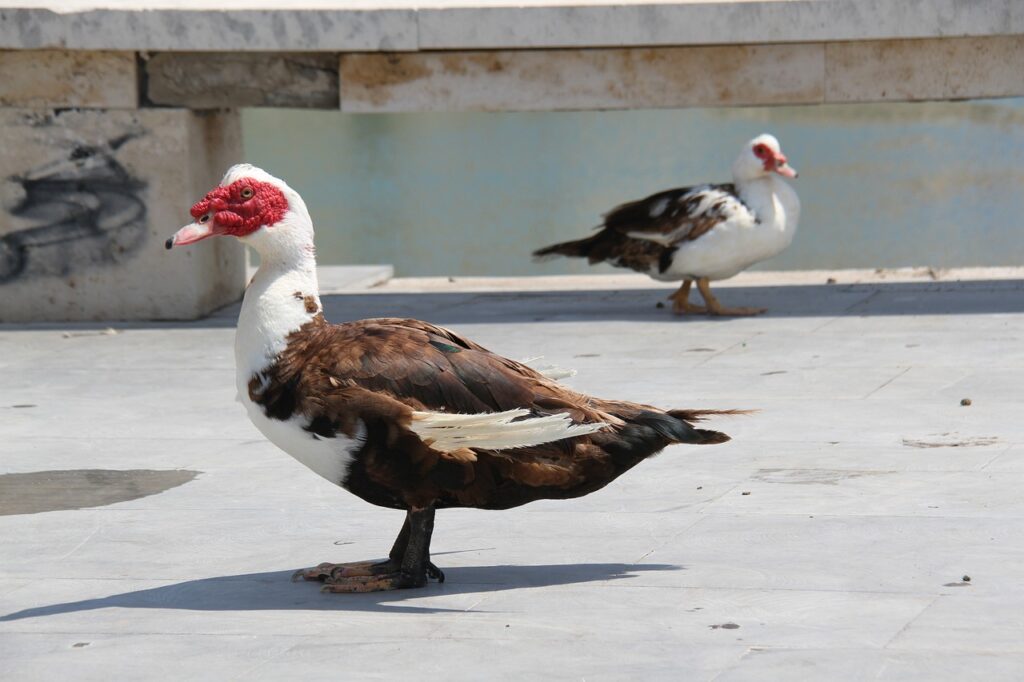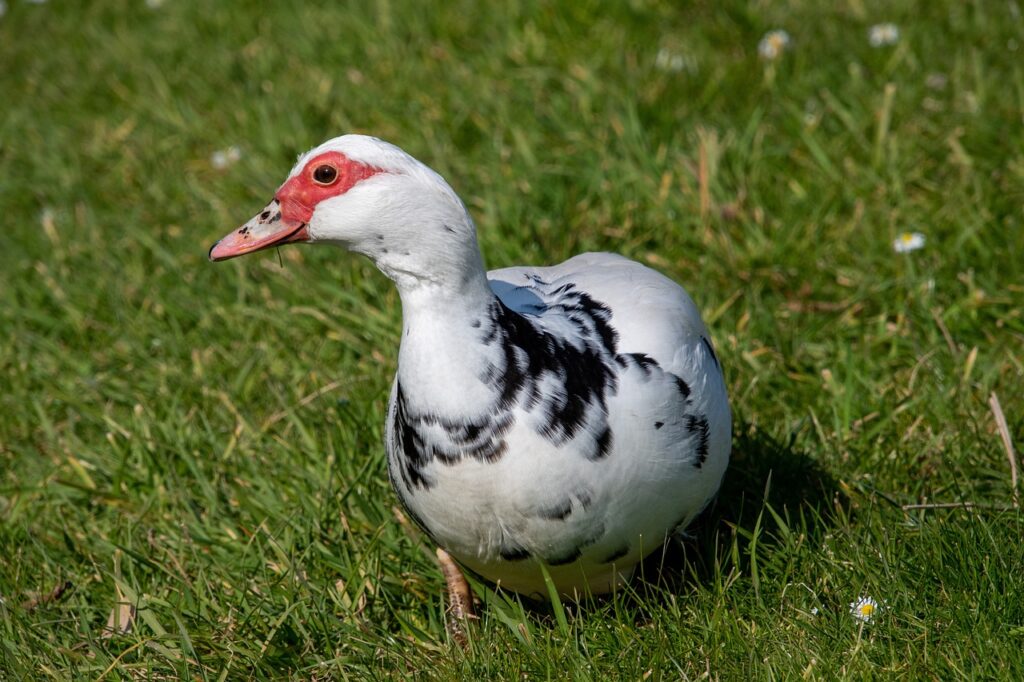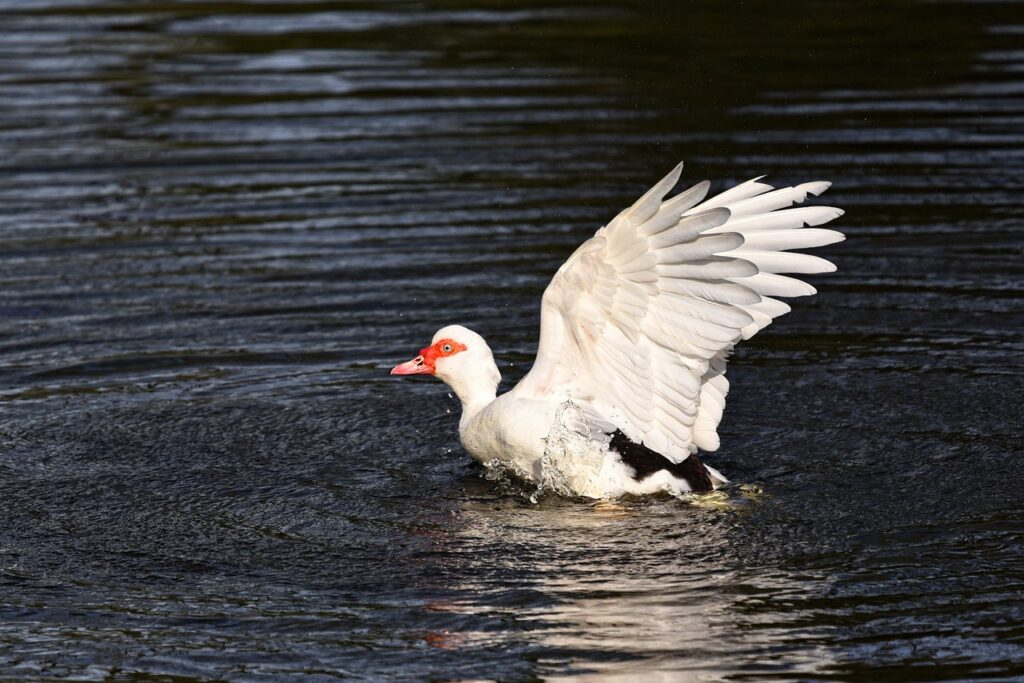
When it comes to unique waterfowl, the Muscovy duck often stands out. With its distinct appearance, intriguing behaviours, and fascinating history, the Muscovy duck is a bird worth knowing about. Whether you’re a wildlife enthusiast, a backyard farmer, or simply curious, this guide will answer your burning questions and provide you with a deep dive into the life of the Muscovy duck.
Where Did the Muscovy Duck Come From?
The Muscovy duck (Cairina moschata) is native to Central and South America. These ducks have been around for centuries, first domesticated by Indigenous peoples of the Americas. Unlike many other domesticated ducks, which trace their lineage to the Mallard, the Muscovy duck has a distinct lineage, making it one of a kind.
Why Do People Not Like Muscovy Ducks?
While some people adore Muscovy ducks for their quiet demeanour and utility, others view them less favourably. Here’s why:
- Messiness: Muscovy ducks can be prolific poopers, which is problematic in suburban or urban areas.
- Aggression: Male Muscovy ducks, in particular, can exhibit territorial aggression, especially during mating season.
- Invasive Potential: In some regions, they are considered invasive and may outcompete native species for resources.

Is Muscovy Duck Poop Toxic?
Like all animal waste, Muscovy duck poop can harbour bacteria like E. coli and Salmonella. Proper hygiene is crucial if you’re handling their droppings or using them as fertilizer. However, their waste is not inherently more toxic than that of other birds.
Where Is Muscovy?
The name “Muscovy” can confuse people. Historically, the term is linked to the Moscow region in Russia. However, the duck itself has no direct connection to Muscovy. Instead, the name likely arose due to old trade routes or misconceptions during European exploration.
Fascinating Facts About the Muscovy Duck
- Distinct Appearance: Muscovy ducks are easily recognizable by the red, warty skin around their faces, known as caruncles.
- Flyers or Not? Unlike many domesticated ducks, Muscovies are capable of flight, making them a challenge to contain in open enclosures.
- Natural Pest Control: They eat a variety of pests, including mosquitoes, flies, and small rodents.
- Quiet Birds: Unlike the quacking Mallard, Muscovies hiss and coo, making them relatively quiet.
The Male Muscovy Duck vs. the Female
Male Muscovy ducks are significantly larger than females, with some weighing up to 15 pounds. They are more territorial and display pronounced caruncles. Females, while smaller and less aggressive, are excellent mothers, often going broody and raising ducklings with care.
Is the Muscovy Duck Invasive?
In regions like Florida and Texas, the Muscovy duck is considered invasive. Their adaptability allows them to thrive in urban and rural environments, sometimes to the detriment of local ecosystems. Authorities in these areas often impose regulations to manage their populations.

What Does the Muscovy Duck Eat?
Muscovy ducks are omnivores. Their diet includes:
- Plants: Grass, weeds, and seeds.
- Insects: Mosquitoes, flies, and beetles.
- Small Vertebrates: Frogs, small fish, and lizards.
Their diverse diet makes them a valuable addition to farms, where they help control pests.
Are Muscovy Ducks Dangerous?
Generally, Muscovy ducks are not dangerous. However, during mating season, males can become aggressive. They might chase or bite perceived threats, especially if they feel their territory is invaded.
Muscovy Ducks and Humans
Are Muscovy Ducks Illegal?
In some regions, keeping Muscovy ducks is regulated. For instance:
- USA: The U.S. Fish and Wildlife Service considers them invasive and restricts their movement.
- UK: They can be kept as pets but require proper enclosures to prevent escape.
Muscovy Duck Laws
Before adopting or raising Muscovy ducks, it’s vital to check local laws. Some places require permits, while others restrict their breeding to prevent overpopulation.
Caring for Muscovy Ducks
Muscovy Duck Enclosure Requirements
Providing the right environment ensures the health and happiness of your ducks:
- Space: Each duck needs at least 10 square feet of outdoor space.
- Water Source: While they don’t require a large pond, access to clean water for bathing is essential.
- Shelter: Protect them from predators with a secure coop.
Can a Muscovy Duck Hatch Chicken Eggs?
Yes! Broody Muscovy ducks are excellent incubators and will readily hatch chicken eggs, often outperforming hens in the process.
Is Muscovy Duck Good to Eat?
Muscovy duck meat is leaner than most other duck breeds, with a flavour often compared to veal. It’s a favourite among chefs for its rich taste and versatility in recipes.
The Incubation Period of Muscovy Ducks
The incubation period for Muscovy ducks is approximately 35 days, longer than the average for most duck breeds. During this time, the mother diligently tends to her eggs, ensuring the right temperature and humidity.
Conclusion
The Muscovy duck is an extraordinary bird with a unique blend of traits that make it both a challenge and a delight to own. From their rich history and striking appearance to their utility in pest control and meat production, Muscovies are a fascinating subject of study and companionship. Whether you’re considering keeping them or simply want to learn more, understanding these ducks is the first step toward appreciating their role in nature and human life.
Have you had experiences with Muscovy ducks? Share your stories or questions in the comments below. Let’s keep the conversation going about these remarkable birds!